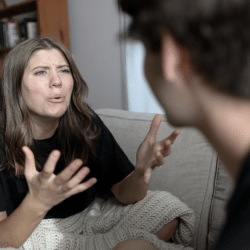
Coming-of-age movies aren’t just for teenagers. Some of the most profound lessons about identity, vulnerability, friendship, and growth don’t hit until years later, when you’re paying rent, losing touch with old friends, or staring down your own reflection wondering what’s next. These films aren’t about high school lockers or prom nights. They’re about the messy, uncertain journey of becoming, and what it means to keep becoming, even when you think you already have. Watching them in your 30s is less about nostalgia and more about finally understanding what they were really trying to say.
Boyhood (2014)

Shot over 12 years, this isn’t just a film, it’s a meditation on change. Watching it in your 30s, you notice the quiet moments more than the milestones. The way time slips by, unnoticed, until you realize everything has changed. It reminds you that coming of age isn’t a chapter, it’s a lifelong process. And it hits differently when you’re already deep into adulthood.
The Perks of Being a Wallflower (2012)

What once felt like teen angst now feels like emotional survival. The film’s quiet truths about trauma, friendship, and finding your place resonate more when you’ve known loss. As an adult, Charlie’s silence feels heavier, and his healing more earned. The “infinite” moment still lands, but now you know how rare it is. It’s not just about high school, it’s about feeling seen.
Frances Ha (2012)

Frances isn’t a teenager, she’s a 27-year-old mess figuring it out. And for anyone in their 30s still navigating career confusion or friendship shifts, it feels eerily familiar. The awkwardness of outgrowing people while trying not to outgrow yourself is all over this movie. It doesn’t offer answers, just permission to flail a bit. And that’s oddly comforting.
The Way Way Back (2013)

At 14, Duncan is overlooked and insecure. In your 30s, you realize how many adults still feel like him. Sam Rockwell’s water park mentor seems goofy at first, but his kindness becomes the heart of the film. It’s a reminder that growth doesn’t require grand gestures, just someone who makes space for you. Sometimes that’s all any of us need.
Good Will Hunting (1997)

What starts as a genius rebel story becomes a gut punch about vulnerability. In your 30s, Will’s resistance to connection feels less cool and more heartbreaking. Robin Williams’ monologue about real love hits harder now that you’ve likely lived through loss. It’s a film about doing the hard emotional work, even when you’d rather stay angry. Growth isn’t just academic, it’s relational.
Almost Famous (2000)

What felt like a dream job at 15 now reads like a cautionary tale. The film’s take on fame, boundaries, and identity becomes more layered with age. Penny Lane’s heartbreak is no longer secondary, it’s central. And the line “It’s all happening” feels less like excitement, more like a warning. It’s about learning to keep your soul intact in chaotic spaces.
The Spectacular Now (2013)

Sutter’s charm masks something many men recognize: avoidance. As a teen, his recklessness looks wild. As an adult, it looks like fear. His arc isn’t a clean transformation, it’s a slow, honest look at emotional responsibility. Watching it older, you understand the cost of staying stuck in the now. Especially when you know how quickly it can all shift.
The Breakfast Club (1985)

When you’re young, it’s about rebellion. In your 30s, it’s about masks. You see how each character performs a version of themselves to survive judgment. And you realize how many adults still do that. The lines feel more like defense mechanisms than identities. The beauty of it? They drop the act, if only for a day. Sometimes that’s all it takes.
Stand by Me (1986)

At first glance, it’s a childhood adventure. But deeper down, it’s a study in grief and emotional honesty. The final voiceover about friends hitting differently at 12 than at 30 takes on new meaning when those friendships start to fade. It’s not just about growing up, it’s about what gets left behind. And how some moments define you forever.
Garden State (2004)

Critics were divided, but time has been kind to this film’s emotional aimlessness. Watching it in your 30s, you feel the weight of numbness, the disconnection from home, and the awkward attempts to reengage with life. It’s not about grand transformation, it’s about small emotional risks. And how hard it is to feel again when you’ve been shut down for years.
The Kings of Summer (2013)

Three teenage boys build a house in the woods to escape their parents, and unknowingly build themselves in the process. On the surface, it’s funny and free-spirited. But beneath that, it’s about male intimacy, unspoken grief, and growing up in the shadow of silence. Watching it older, the emotional repression stands out more than the humor. And it sticks.
Eighth Grade (2018)

It’s brutal in its honesty. Watching it in your 30s reminds you how early the pressure starts, to be liked, to be perfect, to know who you are. The social anxiety, the overthinking, the forced smiles, it never fully goes away. Bo Burnham doesn’t give you nostalgia. He gives you truth. And truth always lands hard.
Moonlight (2016)

Chiron’s story is one of the most quietly powerful portrayals of masculinity ever put to screen. As a boy, a teen, and a man, he’s shaped by silence and shame. But in your 30s, you see how survival can look like stillness, and how vulnerability is often the bravest act. Every scene is loaded with emotion that’s rarely spoken. And that’s the point.
Lady Bird (2017)

It may center on a teenage girl, but the themes are universal: longing, pride, identity, and the messy relationship between parent and child. Watching it older, you notice the mother’s pain as much as Lady Bird’s rebellion. The film becomes less about leaving home and more about how home shapes you, whether you want it to or not.
The 400 Blows (1959)

This French classic captures a boy’s quiet rebellion against a world that never really listens. What seemed slow or distant as a teen now feels raw and urgent. The final freeze-frame stays with you, not just because of its ambiguity, but because you know that feeling. Of wanting to be seen but not knowing how to ask. It’s haunting because it’s real.
Dead Poets Society (1989)

“Carpe diem” hits differently when you’ve watched time slip through your fingers. The poetry, the rebellion, the hunger for meaning, all of it resonates deeper with years behind you. Robin Williams’ role feels less like a teacher and more like a permission slip. To speak, to feel, to live fully, before it’s too late. That message doesn’t age.
Into the Wild (2007)

What once felt like romantic escapism now reads as emotional retreat. Chris McCandless’ journey looks different when you’ve lived a bit. His rejection of comfort, conflict, and connection feels more complex. There’s truth in his search, but also tragedy in his isolation. And in your 30s, you start to question whether disappearing is really freedom.
The Graduate (1967)

Ben’s aimlessness after college is universal, but watching it older, you notice how paralyzed he is by expectation. The drifting, the silence, the blank stares, they all say more than words. The final scene, once triumphant, now feels uncertain. As it should. Because growing up isn’t about answers, it’s about realizing how few of them there really are.
Inside Llewyn Davis (2013)

Llewyn isn’t searching for stardom, he’s searching for meaning after loss. Watching this in your 30s, his cynicism hits harder. The cycle of near-success, the quiet heartbreak, the stubbornness, it all feels eerily familiar. Sometimes growing up looks like standing still. And sometimes standing still is all you can do.
Call Me by Your Name (2017)

What once felt like a summer romance now feels like a masterclass in emotional presence. Elio’s heartbreak isn’t tragic, it’s transformative. The way he allows himself to feel, fully and unapologetically, is something many adults still struggle with. That closing shot by the fire says everything. Sometimes, the most mature thing you can do is grieve with your whole chest.






Ask Me Anything